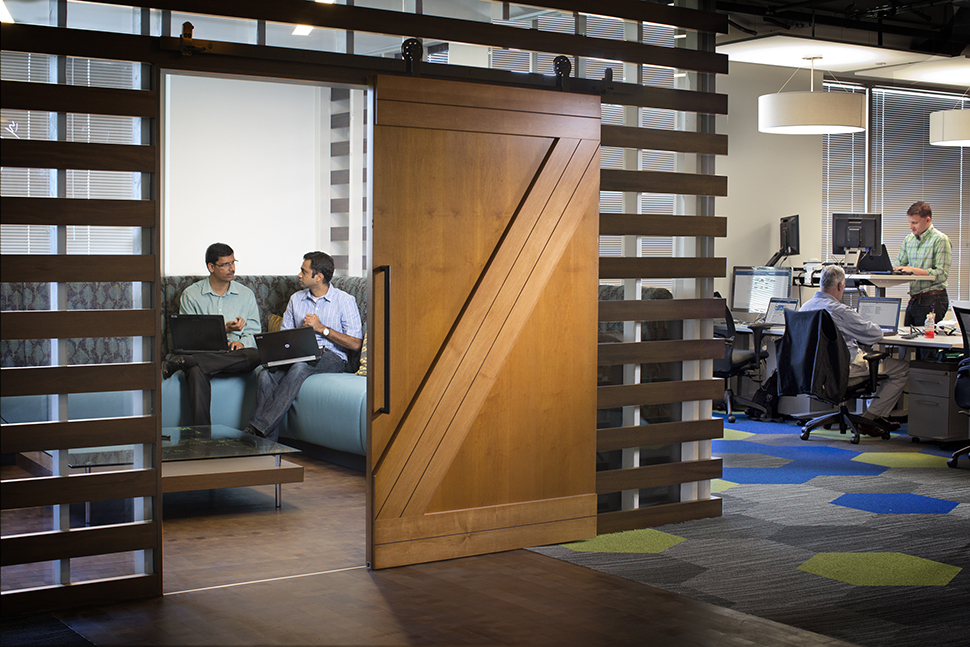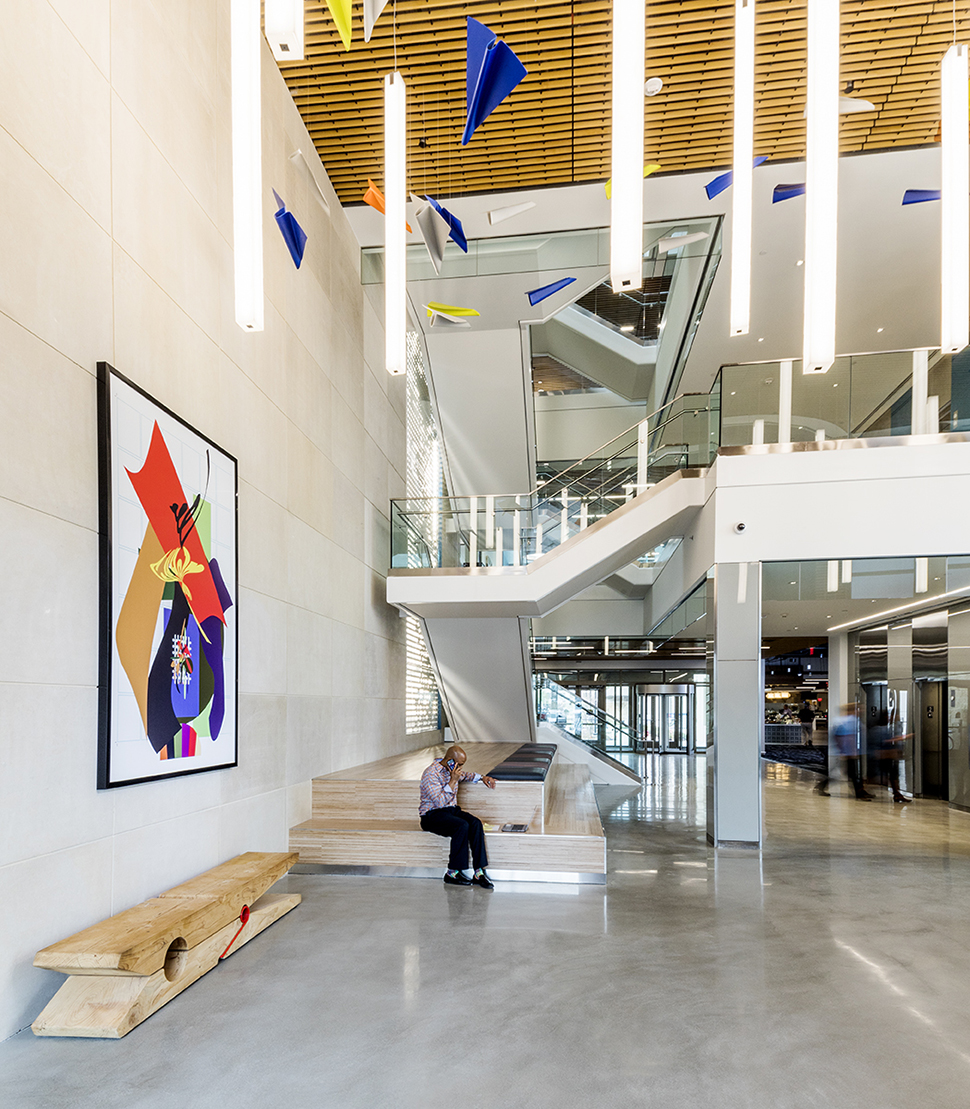If you’ve wondered whether the COVID WFH experience will change the office forever, wonder no more—another big shoe just dropped on the side of flexible work life. Capital One Founder and CEO Richard Fairbank announced in an internal memo released today that “Capital One will become a hybrid work company going forward, adopting a ‘flexible hybrid model’ that allows a significant majority of our associates to spend some of their time working in the office and some of their time working virtually.”
The announcement will impact all 5,000-plus Capital One associates in Dallas-Fort Worth, the company says, and shape the work lives of its 52,000 associates overall.
“It has now been over a year since tens of thousands of associates at Capital One transformed their homes and apartments into offices,” Fairbank said in his memo. “Despite all that has happened, Capital One has persevered. In fact, we have thrived. We have taken care of customers, welcomed thousands of new colleagues, and remained financially resilient under stress. We have adapted strikingly well, and we have found that we can be highly effective in a virtual work environment. This way of working felt new and strange a year ago. Today, it feels almost normal.”
It’s about to stay that way—at least part of the work week.
“Earlier this year, we announced that work-from-home will be how the majority of our contact center and operations associates will do their jobs in the future,” Fairbank writes. “Today, I am outlining how we expect to work together across the 30,000 Capital One associates not covered by these previous announcements.”
The memo’s key points:
- Mondays and Fridays will be enterprise-wide virtual work days. Capital One associates will work on their own from home or wherever they work best.
- Capital One offices will be fully open Tuesdays through Thursdays.
- Associates are “strongly encouraged” to spend meaningful time in the office collaborating with colleagues.
- Teams will coordinate time in the office to harness the benefits of co-location.
- Associates will not be required to be in the office a certain number of days. Instead, the company wants its associates and leaders to “balance in-person collaboration and team needs with individual choice and flexibility.”
- As the pandemic plays out—at least through end of 2021—coming into the office will be strongly encouraged but not mandatory.
- Capital One will continue to support “fully remote” exceptions with senior executive approval
96% of associates like working virtually
The “Fairbank Memo,” as it may one day be known, should go down well with Capital One associates. A recent survey shows that 96 percent of them want virtual work to be part of their regular schedules.
Fairbank believes remote work can be both effective and empowering. He ticks off the reasons why—and millions must be nodding along with them:
“Our commutes are a lot shorter. Our daily schedules are more efficient. Life’s demands don’t always fit around a 9-to-5 work schedule. Virtual work has allowed us to better balance the competing demands of our work and our personal lives.”
According to Bloomberg News, a May survey showed that 39% of workers would quit if their employers weren’t flexible about remote work. And only about 32 percent of U.S. office workers have gone back to work at their buildings, according to a Kastle Systems index of 10 metro areas.
Still, some are pushing back against remote work, extolling the benefits of in-office collaboration—and Fairbank sees their side too.

The Garage at Capital One’s campus in Plano, Texas [Photo: Capital One]
The benefits of office
“Our offices and campuses provide unique opportunities for planned collaboration, innovation, connection, and mentorship,” he writes in his memo. “We also benefit from unplanned interactions with people on and outside of our teams—the hallway conversation or lunch at the cafeteria. And for newer Capital One associates, being in-person allows them to be surrounded by colleagues, participate in team events, find mentors, build networks, and accelerate learning.”
Compelled by both perspectives, Capital One decide to declare its future as a hybrid work company—and Fairbank knows that won’t be easy.
A hybrid model, but still on the same page
When everyone was at the office, and when everyone worked from home, everyone was on the same page. In a hybrid model that won’t always be true. Fairbank says that’s presented some unique challenges and been the subject of much conversation and debate. It’s part of what led the company to have everyone work virtually on Mondays and Fridays.
“This initial approach provides associates meaningful time working from home and scales virtual work across the company in an efficient way,” Fairbank writes. “It also concentrates the time when we are in the office in order to maximize the opportunity for in-person collaboration that we know is an important and impactful part of Capital One’s culture.”
Fairbank says the company will listen and adapt to how this initial approach works for its associates, businesses, and customers.

Capital One’s Plano campus [Photo: Capital One]
Working fully remotely
Some Capital One employees have expressed “keen interest” in working fully remotely on a full-time basis. While exceptions will allow for this in some cases, subject to senior executive approval, the company will expect “the significant majority” of associates to work in a hybrid model. Capital One says it will provide more information later this year about its approach to long-term fully remote work.
“While remote or virtual work is something people have done in some jobs for decades, we collectively discovered something remarkable during this pandemic,” Fairbank writes. “Remote work is not a niche opportunity—it works at scale in the mainstream. Two things propelled the success of virtual work during this pandemic: advances in technology and the fact that the whole world went remote at the same time.”
Reopening September 7—vaccinations encouraged
Capital One plans a reopening on September 7, and says it will be sensitive to health concerns about COVID-19. But it “strongly encourages” every associate to get vaccinated. The company says 80 percent of its exempt associates have responded to its vaccine surveys. As of last week, 86% of them have reported being fully vaccinated against COVID-19,
“Our own data in this country shows that unvaccinated Americans are 700 times more likely to die from COVID-19 than those who have been fully vaccinated,” Fairbank writes, prodding the remaining associates to reconsider.
Masks for the unvaccinated
“We ask that unvaccinated associates wear a mask when they are in the office in order to protect their colleagues. We realize, of course, that some vaccinated associates will also choose to wear a mask.”
Fairbank makes clear that uncertainties remain with new COVID variants in global circulation, and that Capital One may make adjustments to its vaccination and on-site policies when warranted.
“On the shoulders of our tech transformation, we will continue to transform how we work,” he signs off in the memo. “As always, our quest is to enable our great people to be great in the most fulfilling of ways. I am inspired to join each of you on this journey.”
![]()
Get on the list.
Dallas Innovates, every day.
Sign up to keep your eye on what’s new and next in Dallas-Fort Worth, every day.

































































